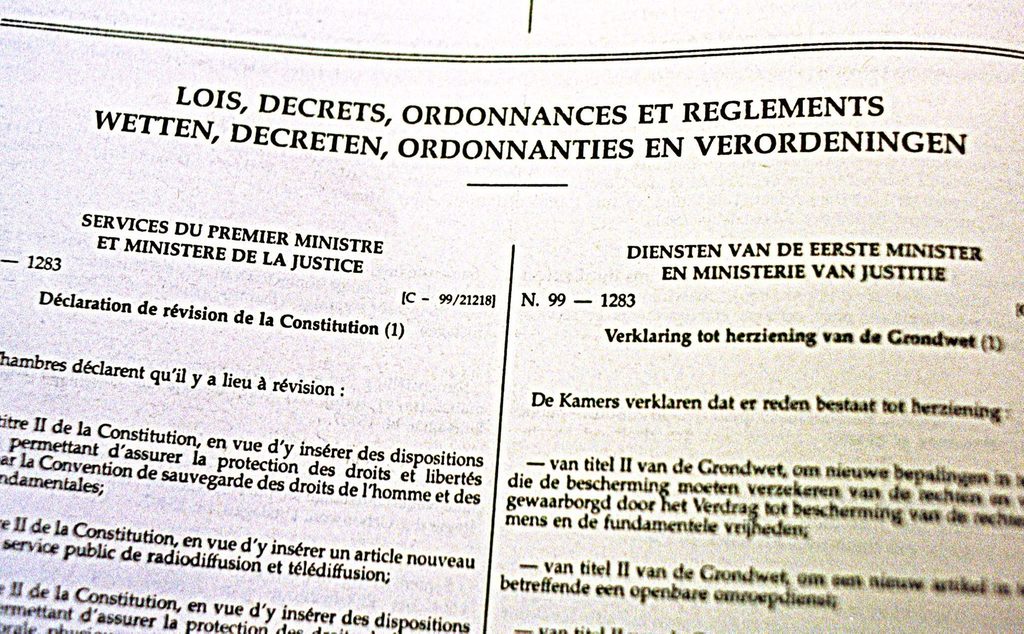With its complex language divide and convoluted system of governance that confuses visitors (and nationals), Belgium has something of a reputation for rules that can only be explained by the "That's so Belgian" refrain.
When put to the test, many of these peculiar laws turn out to be no more than oft-repeated hearsay (like how it's supposedly legal to throw Brussels sprouts at tourists). Still, the real ones are often as silly and bizarre as the urban myths.
Many laws that today seem nonsensical reveal clues about the era they were created and point to issues that legislators once cared deeply about. Whether this means keeping Dutch royals at bay, making sure you don't lose your livestock, or hiding corpses, it is fair to say that Belgium has its share of strange laws.
1. Escaping from prison is not illegal
In Belgium, the philosophy of the law holds that it is human nature to desire freedom and want to escape. It follows that escapees who do not break any other laws (such as hurting someone when breaking out or stealing a vehicle to get away) cannot be punished for the act of escaping itself.
About nine in ten inmates who manage to escape are arrested again but no extra time can be added to their sentence.
Belgium is not the only country with this law – the same principle applies in the Netherlands, Germany, Austria and Sweden, among others.
2. The Belgian flag is wrong, according to Belgian law
While Belgium's flag is a tricolour of black, yellow and red, article 193 of the Belgian Constitution states that "the Belgian Nation adopts red, yellow and black for its colours."
The jumbled order of colours goes back to the period following the Belgian Revolution of 1830: the national flag originally had horizontal bands of red over yellow over black, rather than today's vertical stripes.
But the bands were rotated 90 degrees soon after and the order was changed, partly due to the desire to differentiate from the horizontal stripes of the Dutch flag and align with the French vertical standard.
But though the flag was re-oriented, the Constitution remained unchanged, leading to almost two centuries of constitutional contradiction.
3. Independence? Belgian King can still mobilise troops in Congo
Despite the Democratic Republic of the Congo (DRC) achieving independence in 1960, the King of Belgium is still legally allowed to mobilise the military in "Belgian-Congo" to protect the country's citizens in the event of war.
The King may even take such measures proactively, in times of peace. Needless to say, this law has not been invoked.

Credit: Belga/Herwig Vergult
4. No Dutch royals on the Belgian throne, ever
Have you ever been so angry that you never wanted to speak to someone ever again? That's the spirit that led to a decree on 24 November 1830, which bans members of the House of Orange-Nassau (essentially: the Dutch royal family) from any position of power or public authority in Belgium – in perpetuity.
Theoretically, they are not only forbidden from sitting on the Belgian throne, they also cannot access the public sector or stand for elections.
The decree dates back to the period immediately following the rule of the Dutch King William I from 1815 until Belgian independence in 1830.
5. You can keep your last cow (or 12 sheep or goats), pig, and chickens
The Belgian Judicial Code provides a list of goods and items that may not be seized by a bailiff (art. 1408), in order to safeguard minimal living conditions.
While the list is a useful guard against complete dispossession, many items now seem rather dated. For instance, no one can lay claim to a debtor's "cow, or 12 sheep or goats" (a tough choice). Nor can someone’s last (or only) pig and 24 poultry animals be seized.
Materials required for keeping and feeding said livestock "for the duration of one month" can also not be seized.
In March 2023, Belgian authorities finally updated this list meaning that soon your farm animals will no longer be yours unconditionally. But if bailiffs do come knocking, they won't have the right to take away your laptop, printer, or mobile phone.
6. Young healthy men may not take leftover crops, but anyone else can
Dating back all the way to 1876, Belgium's Field Code regulates who is allowed to pick the remains of the crops left on the field after harvesting – a practice known as gleaning.
According to the Code, this right is reserved for "the elderly, cripples [sic], women, and children below 12 years of age" (art. 11). These groups of people may glean from sunrise to sunset but only manually: using a rake "with iron teeth" is penalised.
The provision dates back to when the agricultural schools and the ‘Supreme Council for Agriculture’ wanted to end gleaning abuses, demanding an outright ban. In response, the legislator tried to reconcile property rights with the needs of the poor by permitting only the most vulnerable in society to glean.
Related News
- A beginner's guide to Belgium's political parties
- Belgian politics for dummies: Who is in power where?
- Why Belgium has six governments (and not seven)
7. If a family member kills someone, you can hide the body
As you'd expect, hiding or disposing of a murder victim is a punishable offence. Except that is, if the murderer happens to be a direct relation, such as a parent, grandparent, sibling, child, or spouse (even after divorce); a loophole in Belgian law means that you can hide the corpse if such a relation was the murderer.
But wait, Belgian law also requires witnesses to report crimes to the relevant authorities. Meaning that in practice you can only hide the body if you didn't see the murder being carried out. Go figure.
8. Dogs and oxen can be requisitioned to move army vehicles
Belgium has several laws that have become antiquated by advances in technology and this one is still part of military code. But in the event of army machines breaking down, be prepared to provide your dogs and oxen to keep the convoy moving. The law dates back to 1939 and specifies that "beasts of burden (horses, oxen, dogs, etc.)" can be requisitioned "for any vehicles employed by the army."
Always useful if there's no more fuel in the tank.
9. Wives can peddle their husbands’ commercial goods
Evolving gender roles also account for unlikely laws today. While much of discriminatory legislation has been rewritten or removed from law books, article 10 of the Belgian Code of Commerce still permits "the married woman to peddle wares from her husband’s business" without being subject to the obligations of merchants.
Whether enterprising wives should also let their husbands know about these transactions is not specified.
Do you know of any other silly, outdated or otherwise weird laws we may have missed? Let us know on Twitter @Maajtee or @BrusselsTimes.

